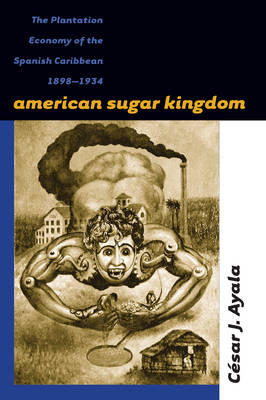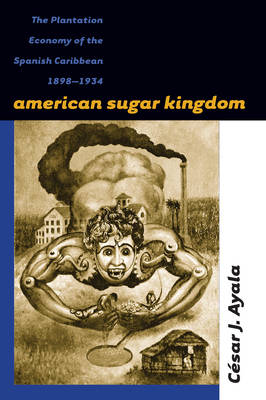
- Afhalen na 1 uur in een winkel met voorraad
- Gratis thuislevering in België vanaf € 30
- Ruim aanbod met 7 miljoen producten
- Afhalen na 1 uur in een winkel met voorraad
- Gratis thuislevering in België vanaf € 30
- Ruim aanbod met 7 miljoen producten
Zoeken
American Sugar Kingdom
The Plantation Economy of the Spanish Caribbean, 1898-1934
César J Ayala
Paperback | Engels
€ 69,45
+ 138 punten
Omschrijving
Engaging conventional arguments that the persistence of plantations is the cause of economic underdevelopment in the Caribbean, this book focuses on the discontinuities in the development of plantation economies in Cuba, Puerto Rico, and the Dominican Republic in the early twentieth century. Cesar Ayala analyzes and compares the explosive growth of sugar production in the three nations following the War of 1898--when the U.S. acquired Cuba and Puerto Rico--to show how closely the development of the Spanish Caribbean's modern economic and social class systems is linked to the history of the U.S. sugar industry during its greatest period of expansion and consolidation.
Ayala examines patterns of investment and principal groups of investors, interactions between U.S. capitalists and native planters, contrasts between new and old regions of sugar monoculture, the historical formation of the working class on sugar plantations, and patterns of labor migration. In contrast to most studies of the Spanish Caribbean, which focus on only one country, his account places the history of U.S. colonialism in the region, and the history of plantation agriculture across the region, in comparative perspective.
Ayala examines patterns of investment and principal groups of investors, interactions between U.S. capitalists and native planters, contrasts between new and old regions of sugar monoculture, the historical formation of the working class on sugar plantations, and patterns of labor migration. In contrast to most studies of the Spanish Caribbean, which focus on only one country, his account places the history of U.S. colonialism in the region, and the history of plantation agriculture across the region, in comparative perspective.
Specificaties
Betrokkenen
- Auteur(s):
- Uitgeverij:
Inhoud
- Aantal bladzijden:
- 336
- Taal:
- Engels
Eigenschappen
- Productcode (EAN):
- 9780807847886
- Verschijningsdatum:
- 24/11/1999
- Uitvoering:
- Paperback
- Formaat:
- Trade paperback (VS)
- Afmetingen:
- 156 mm x 235 mm
- Gewicht:
- 530 g

Alleen bij Standaard Boekhandel
+ 138 punten op je klantenkaart van Standaard Boekhandel
Beoordelingen
We publiceren alleen reviews die voldoen aan de voorwaarden voor reviews. Bekijk onze voorwaarden voor reviews.











